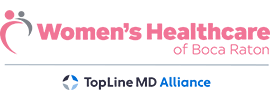Disclaimer: Please note that this blog is for educational purposes only, it includes general information on health-related topics. Women’s Healthcare of Boca Raton is giving medical advice to Patients Only. Follow this link to request an appointment with Dr. Ellman.
Why and When Should You Start Taking Prenatal Vitamins?
If you’re pregnant or are planning to get pregnant, your doctor may recommend taking prenatal vitamins, as it can be hard getting the nutrients and vitamins you need during your pregnancy. Prenate pills can provide support for your body and baby’s development.
What do prenatal vitamins do? Can you take prenatal vitamins if you’re not pregnant? What happens if you’re not taking prenatal vitamins during your pregnancy? What happens if you don’t take prenatal vitamins? Do prenatal vitamins help you get pregnant?
Learning more about prenatal vitamins side effects, the benefits that these pills offer, and whether they can increase fertility can help ensure that you’re getting the right nutrients before, during, and after your pregnancy.
What Do Prenatal Vitamins Do?
If you’re wondering, “What do prenatal vitamins do?” “Do prenatal vitamins substitute a healthy diet?” read on.
Prenatal vitamins are not substitutes for a healthy diet, as you still need to consume foods rich in nutrients and minerals. They help maintain the vitamins and nutrients your body needs to support your pregnancy.
Be sure to discuss with your doctor to determine when to start taking prenatal vitamins and which formulas they recommend. If you take more than the recommended dose, you can harm your baby. Some of their nutrients include:
- Folic acid: It is a B vitamin that pregnant women need to help their baby grow and develop. It can also prevent birth defects. You can take between 400 to 800 micrograms (mcg) of folic acid every day.
- Iron: Patients need to take 27 milligrams of iron a day, as it supplies oxygen to the fetus and supports the placenta’s development. It can also prevent anemia, a condition in which you don’t have enough healthy red blood cells.
- Calcium: We recommend taking 1,000 milligrams of calcium a day. This helps the baby to develop its bones, muscles, and teeth.
- Docosahexaenoic acid (DHA): This is an omega-3 fatty acid that can prevent pregnancy-related complications.
- Zinc: It reduces preterm births.
- Vitamin A: Helps with eye development. Patients can take e700mcg a day. If you take it in large doses it can cause birth defects.
Possible Prenatal Vitamins Side Effects

The iron in prenatals can cause constipation, and you may also have low appetite, stomach cramps, dark stools, and diarrhea. You can ease your symptoms by:
- Drinking a lot of fluids.
- Eating more food rich in fiber.
- Getting more physical activity.
Other prenatal vitamins side effects that can appear include:
- Back pain.
- Muscle pain.
- Dizziness.
- Blurred vision.
- Dry eyes.
- Hives.
- Teeth staining.
Let your doctor know if you are taking pain relievers, heart medications, high blood pressure pills, sulfamethoxazole, or diuretics, as these can have negative interactions with prenate pills. Your healthcare provider can advise you on when to start taking prenatal vitamins.
Now, we can move on to the next section: “Do prenatals help you get pregnant?” where we will address the following question: Do prenatal vitamins make you fertile? and also discuss when to start taking prenatals.
Do Prenatals Help You Get Pregnant?
If you’re wondering when to start taking prenatals and whether they can boost your fertility, read on. You’ll find answers to questions like: Do prenatals help you get pregnant? Do prenatal vitamins make you fertile?
Prenate pills do not increase fertility, but they can help you experience a healthy pregnancy and prevent complications.
The Centers for Disease Control and Prevention (CDC) advice women on when to start taking prenatals. Women who are planning to get pregnant should take their vitamin three months before conception.
Here are the benefits of taking prenatal vitamins before pregnancy:
- Some birth defects can appear during the first month of the pregnancy before you find out that you’re pregnant. You can take folic acid to prevent neural tube defects, because the baby’s neural tube, which becomes the brain, develops early in the pregnancy.
- You can take prenatals with vitamin D, as it can strengthen your baby’s bones and lower the risk of miscarriage during the first trimester. You can get vitamin D from red meat, liver, and egg yolk.
- Iron-deficiency anemia is common in early pregnancies. Pregnant women need more doses of iron than those who are not pregnant. The iron in prenatal vitamins can keep your oxygen flowing to your organs.
- Taking prenatal vitamins before pregnancy can help prepare your body to get all the nutrients for you and your baby. If you’re not taking prenatal vitamins, you wouldn’t be able to share the nutrients with your baby as they grow.
- Your body needs healthy eggs to support your pregnancy, as they develop 90 days before they are released.
So, do prenatal vitamins make you fertile? A recent study does mention that vitamin B, folic acid, omega-3 fatty acids and healthy diets may increase fertility, and you can find some of these ingredients in the Conception Fertility Prenatal Vitamins Product.
The Conception Fertility Prenatal Vitamins can help regulate your cycle and prepare your body for pregnancy.
Suppose you’re already pregnant and haven’t been taking prenatals. You can work closely with your doctor so they can advise on when to start taking prenatal vitamins and whether the Conception Fertility Prenatal Vitamins product is right for your body.
What Happens If You Don’t Take Prenatal Vitamins?
Taking prenatal vitamins before pregnancy can help prevent miscarriages, defects, and preterm labor. If you’re not taking prenatal vitamins, neural tube defects can appear:
- Anencephaly: This occurs when the baby’s skull and brain doesn’t form correctly. Babies that are born with anencephaly don’t survive.
- Spina bifida: This occurs when the spine does not form correctly and the baby may have physical disabilities.
Now that we have addressed one of the most asked questions, “What happens if you don’t take prenatal vitamins?”, we can move on to the next section: When to take prenatal vitamins.
When to Take Prenatal Vitamins
It’s best to take the prenatal at the same time every day so you don’t forget about it. You can adjust the timing when to take prenatal vitamins to address some of their side effects. For instance, if you have nausea, you can take the vitamin with food.
You can also take them before lunch – A prenate pill that consists of iron, calcium, and folic acid is absorbed better if you take it on an empty stomach, as iron can’t properly absorb if you have just eaten dairy food.
Can You Take Prenatal Vitamins If You’re Not Pregnant?

One of the top questions on a patient’s mind is: Can you take prenatal vitamins if you’re not pregnant?
If you’re planning to get pregnant you can start taking folic acid supplements. Half of the United States’ pregnancies are unplanned, so prenatals can protect your pregnancy from complications, as some defects can appear in the early stages of the pregnancy.
However, if you don’t want to get pregnant, it’s best to follow a healthy diet and get the nutrients you need from food. Prenatals can cause adverse effects if you take more than you need to.
Schedule Your Appointment Today
Taking prenatal vitamins and following a healthy diet can lead to a healthy pregnancy and support your baby’s growth. There are various prenatals to choose from, but Dr. Ellman will be happy to find a prenatal vitamin that works best for your body.
Dr. Ellman is a high-risk OB/GYN doctor who established his medical practice in South Florida over 25 years ago. Book your appointment today.
References
Folic Acid Helps Prevent Some Birth Defects. (2020). https://www.cdc.gov/ncbddd/folicacid/features/folic-acid-helps-prevent-some-birth-defects.html
Shmerling, R. H. & Shmerling, A. (2018). Fertility and diet: Is there a connection? https://www.health.harvard.edu/blog/fertility-and-diet-is-there-a-connection-2018053113949Wilson, D., et al. (2015). Pre-conception Folic Acid and Multivitamin Supplementation for the Primary and Secondary Prevention of Neural Tube Defects and Other Folic Acid-Sensitive Congenital Anomalies [Abstract]. https://www.jogc.com/article/S1701-2163(15)30230-9/abstract#%20

Dr. Ellman is a Board Certified OBGYN who established his medical practice in South Florida over 25 years ago. His office, Women’s Healthcare of Boca Raton, is located in Boca Raton, Florida at West Boca Medical Center. Dr. Ellman attended Albert Einstein College of Medicine of Yeshiva University, where he received his medical degree. He went on to intern at Beth Israel Hospital in Boston- an affiliate of Harvard Medical School- and continued his residency at North Shore University Hospital in Manhasset, New York- an affiliate of Cornell Medical School.
Dr. Ellman has practiced Obstetrics and Gynecology in the Boca Raton area since 1995. In addition to treating patients at West Boca Hospital, Dr. Ellman also treats patients through his own private practice, Women’s Healthcare of Boca Raton, located on the West Boca Medical Campus.

